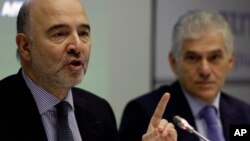A senior European Union official says Greece could reach an agreement with its creditors by the end of the year to ease its bailout debt repayments. A deal would be key to making Greece's debt and bailout program sustainable.
EU Finance Commissioner Pierre Moscovici said Tuesday that the two sides were close to overcoming differences on labor reforms and on how to deal with huge amounts of soured loans to businesses and home owners. An agreement on reforms would unlock a new installment of bailout loans.
"I have urged all [sides] to make an extra effort reach a staff-level agreement in time for the eurogroup of Dec. 5,'' Moscovici said, referring to the group meetings of eurozone finance ministers.
The approval of the reforms and new loans are a precondition for further talks with creditors on debt relief.
Moscovici described a deal on debt relief as "doable.'' Dutch Finance Minister Jeroen Dijsselbloem echoed those remarks from Brussels. Dijsselbloem chairs the eurogroup meetings, with the next due Monday.
Moscovici said he was optimistic that differences on the Greek bailout program between eurozone lenders and the International Monetary Fund would also be resolved.
"There cannot be, there must not be, there won't be a divide between the IMF and the European institutions,'' Moscovici said.
The IMF argues Greece needs immediate better terms on its debt payments for its economy to recover, and has so far not contributed to the country's third international bailout.
But top bailout lender Germany has been reluctant to commit to debt relief measures, arguing that Greece still needs to make fundamental changes to its economy and public administration to avoid overspending.
After last year abandoning promises to repeal the austerity measures contained in the country's bailout program, Greece's left-wing government is pressing its creditors hard for a deal to ease its debt. It wants a deal by the end of the year, arguing that uncertainty caused by Britain's decision to leave the EU and upcoming general elections in European countries would make negotiations tougher at a later date.
Moscovici appeared to share the sense of urgency.
"In this uncertain time for the global economy, and also a turbulent time for world politics, it would send a signal to Greece's European partners, and also to investors, that the country is moving forward on a path of reform and recovery,'' he said.
"There is a window of opportunity.''
Top EU Official: Greece Debt Deal is 'Doable'
update

ATHENS —






